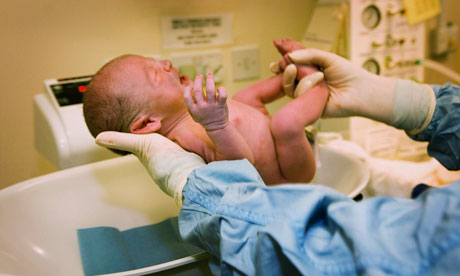
The safety of women giving birth cannot be guaranteed if anticipated cuts in the numbers of midwives in already short-staffed maternity units take place, the Royal College of Midwives is warning.
It is already acknowledged there is a shortage of midwives in the NHS, especially in London and the south-east. But senior midwives surveyed by their college say they are expected to cut numbers even further as hospitals attempt to make savings.
More than a third of midwifery heads surveyed said they would have to reduce the number of staff in the next 12 months – even though 60% say they do not have enough midwives to staff the unit even now. Most senior midwives (79%) said they had job vacancies and that two-thirds of the posts had been empty for more than three months.
The rising birthrate means midwives are stretched and numbers need to increase, they say. In July, the Office for National Statistics reported that the number of births had risen by 2.4% compared with the previous year – a continuation of the decade's steady rise. Between 2001 and 2009, the number of live births in England rose by 107,314 (19%) to more than 670,000 a year.
But the rising complexity of cases is also putting pressure on a creaking system. This is down to a number of factors including the rising number of older women having babies who are more likely to have complex pregnancies. Most senior midwives surveyed (79%) said this was an issue.
Cathy Warwick, the general secretary of the college, said: "These results are deeply disturbing given the steeply rising birthrate and increasing needs of women. Overworked and understaffed maternity units are unsafe maternity units.
"Maternity staffing numbers have simply failed to keep pace with the ever-rising number of births, but now we face the prospect of maternity staff, including possibly midwives, actually losing their jobs. That is what heads of midwifery, who run maternity units up and down the country, are telling us, and that worries me very much."

